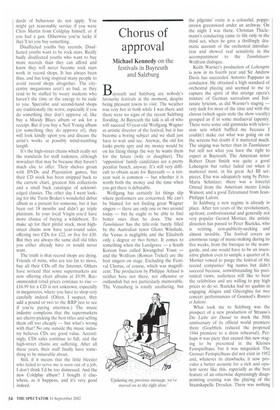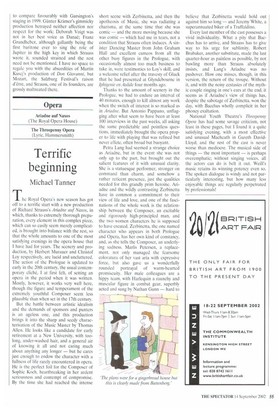Chorus of approval
Michael Kennedy on the festivals in Bayreuth and Salzburg
Bayreuth and Salzburg are nobody's favourite festivals at the moment, despite being pleasant towns to visit. The weather was very hot in both while I was there and there were no signs of the recent Salzburg flooding. At Bayreuth the talk is all of who will succeed 83-year-old Wolfgang Wagner as artistic director of the festival, but it has become a boring subject and we shall just have to wait and see. Anyway, the old fox looks pretty spry and my money would be on his fixing things the way he wants them for the future (wife or daughter). The 'opposition' family candidates are a pretty peculiar bunch, anyway. It's still very difficult to obtain seats for Bayreuth — a tenyear wait is common — but whether it is worth both the money and the time when you get there is debatable.
Wolfgang has certainly let things slip where performers are concerned. He can't be blamed for not finding great Wagner singers — there are only one or two around today — but he ought to be able to find better ones than he does. The new Tannhauser has the title-role barely filled by the Australian tenor Glenn Winslade, the Venus is negligible and the Elisabeth only a degree or two better. It comes to something when the Landgrave — a South Korean bass called Kwangchul Youn — and the Wolfram (Roman Trekel) are the best singers on stage. Excluding the Festival Chorus, of course, which was magnificent. The production by Philippe Arlaud is neither here nor there, not offensive or outlandish but not particularly memorable. The Venusberg is totally unalluring, but
the pilgrims' route is a colourful, poppystrewn greensward under an archway. On the night I was there, Christian Thielemann's conducting came to life only in the third act, when he gave a thrillingly dramatic account of the orchestral introduction and showed real sensitivity in the accompaniment to the TannhiluserWolfram dialogue.
Keith Warner's production of Lohengrin is now in its fourth year and Sir Andrew Davis has succeeded Antonio Pappano as conductor. He obtained a high standard of orchestral playing and seemed to me to capture the spirit of this strange opera's mixture of German surrealism and Italianate lyricism, as did Warner's staging — very dark for most of the time and with the chorus (which again stole the show vocally) grouped as if in some mediaeval tapestry. There were some odd gimmicks with television sets which baffled me because I couldn't make out what was going on on the screens but doubt if it mattered much. The singing was better than in Tannhauser but still not what you have the right to expect at Bayreuth. The American tenor Robert Dean Smith was quite a good Lohengrin but rather faded out when it mattered most, in his great Act III setpieces. Elsa was adequately sung by PetraMaria Schnitzer; there was a forceful Ortrud from the American mezzo Linda Watson; and a good Telramund from JeanPhilippe Lafont.
In Salzburg a new regime is already in place. After ten years of the revolutionary, up-front, confrontational and generally not very popular Gerard Mortier, the artistic direction has passed to Peter Ruzicka, who is retiring, non-publicity-seeking and almost invisible. The festival covers an enormous range of music-making during its five weeks, from the baroque to the avantgarde, and one would have to be an insensitive glutton even to sample a quarter of it. Mortier vowed to purge the festival of the record companies' big names but didn't succeed because, notwithstanding his puritanical views, audiences still like to hear the celebrities and are willing to pay high prices to do so. Ruzicka had no qualms in engaging Alagna and Gheorghiu for two concert performances of Gounod's Romeo et Juliette.
What took me to Salzburg was the prospect of a new production of Strauss's Die Liebe der Danae to mark the 50th anniversary of its official world premiere there (Goebbels reduced the proposed 1944 premiere to a dress rehearsal). Perhaps it was piety that caused this new staging to be presented in the Kleines Festspielhaus, but it was misguided. The Grosses Festspielhaus did not exist in 1952 and, whatever its drawbacks, it now provides a better acoustic for a rich and opulent score like this, especially as the best feature of an otherwise depressingly disappointing evening was the playing of the Staatskapelle Dresden. There was nothing to compare favourably with Garsington's staging in 1999. Ginter Kramer's gimmicky production betrayed neither affection nor respect for the work: Deborah Voigt was not in her best voice as Dame; Franz Grundheber, although gallantly being the first baritone ever to sing the role of Jupiter in the high key in which Strauss wrote it. sounded strained and the rest need not be mentioned. I have no space to regale you with the absurdities of Martin Kusej's production of Don Giovanni, but Mozart, the Salzburg Festival's raison d'être, and Strauss, one of its founders, are grossly maltreated there.











































































 Previous page
Previous page